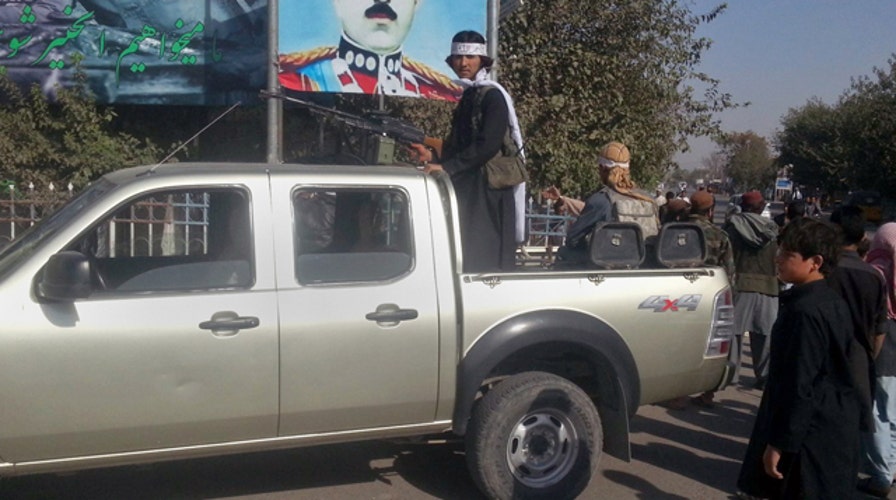US launches airstrike against Taliban in Afghanistan
Afghan forces move to retake northern city from militants
Taliban fighters were attempting to seize control of the airport in the northern Afghan city of Kunduz on Tuesday after overtaking the strategic city a day earlier, Reuters reports.
The fighters were flooding into the airport and about 80 percent of the complex was under their control, according to an Afghan security official.
A Reuters eyewitness said there were was heavy fighting around the airport.
Earlier Tuesday, Afghan President Ashraf Ghani vowed to retake Kunduz from the militants, urging his nation to trust Afghan troops to do the job.
In a televised address to the nation, Ghani said the military had launched a counter-offensive with the help of a U.S. airstrike.
The U.S. military said it carried out the airstrike "in order to eliminate a threat to the force," in the words of U.S. and NATO missions spokesman Col. Brian Tribus. The Associated Press did not elaborate if more airstrikes would follow. The AP also noted that there were no U.S. or NATO troops in Kunduz at the time of the airstrike.
Sarwar Hussaini, a provincial police spokesman, told the Associated Press Afghan forces had launched an operation on several fronts around Kunduz to try and retake the city of approximately 300,000 people.
The Defense Ministry vowed in a statement to Reuters that the city would soon be retaken. Reuters reported that government forces had spent the night holed up at Kunduz's airport after being driven out of the city itself the day before.
The Defense Ministry claimed that the city's prison and the provincial police headquarters had been retaken. That claim could not independently be verified as the city was off limits to media.
An Afghan government official in the city told Reuters that there was heavy fighting in the city and said most residents were without electricity and phone service.
Residents reached over the phone by The Associated Press said sporadic gunfire could still be heard around the city on Tuesday morning.
The city fell Monday, after hundreds of Taliban gunmen launched a coordinated, multi-pronged attack at several points around the city. After a day of fierce fighting, they managed to overrun government buildings and hoisted their flag in the city square. The fast-moving assault took the military and intelligence authorities by surprise.
During the Taliban assault on the city on Monday, the insurgents had freed around 600 inmates -- including 144 members of the Taliban -- from Kunduz prison, officials said.
In Kabul, the National Security Council was to meet later Tuesday over the fall of Kunduz, a government official said, speaking on condition of anonymity to discuss government plans.
After taking the city Monday, Taliban leader Mullah Akhtar Mansour issued a statement aimed at calming the city's residents and calling on the Afghan government to admit defeat.
"These conquests are result of almighty Allah's support and the mujahideen (fighters) sacrifices. Therefore, officials in Kabul have to admit their defeat with courage," the statement said. "Kunduz residents should not be worried about their lives and property. They should continue as normal without any tension
The International Red Cross said it had evacuated two of its three international staff from Kunduz, flying them to the nearby city of Mazar-I-Sharif. The U.N. office in Kunduz was also evacuated.
The city's fall comes as President Ashraf Ghani marks one year in office. The president, who has staked his presidency on pledges of bringing peace to Afghanistan and who seeks to draw the Taliban to peace talks, was to address the nation later Tuesday.
Kunduz is one of the largest and wealthiest cities in Afghanistan, and the surrounding province, also called Kunduz, is one of the country's chief breadbaskets. It lies on a strategic crossroads connecting Afghanistan to Pakistan, China and Central Asia.
The Associated Press contributed to this report.









































